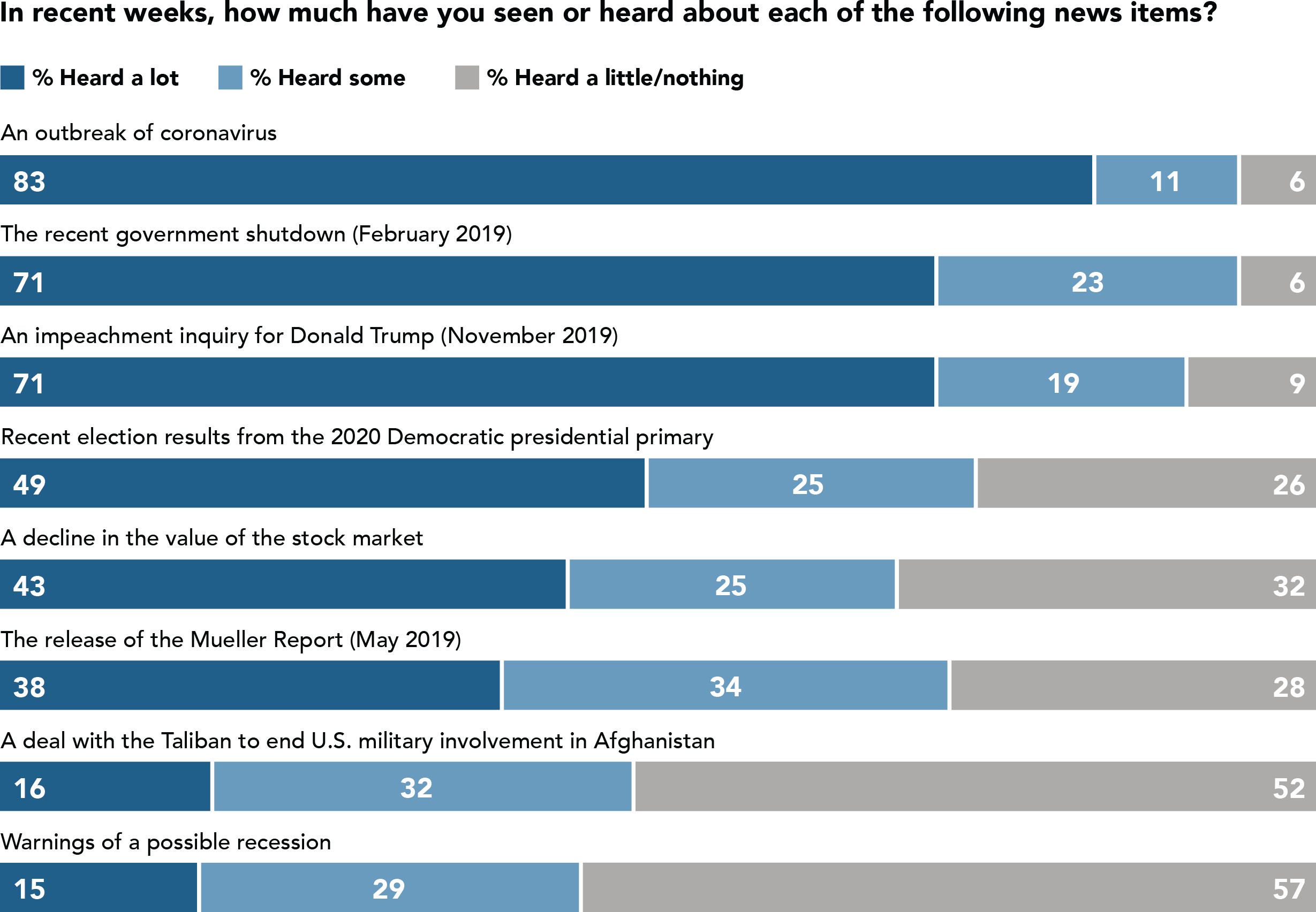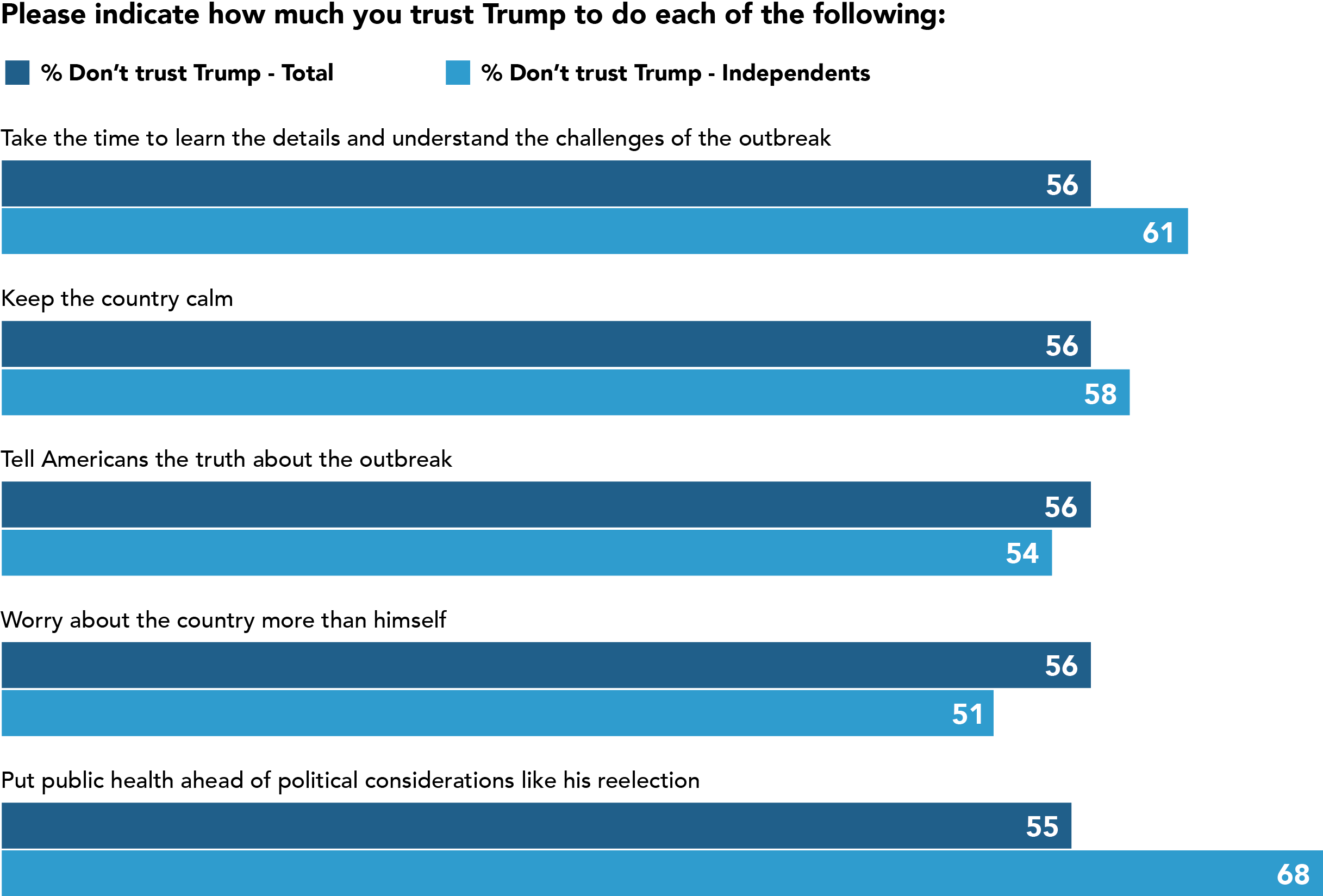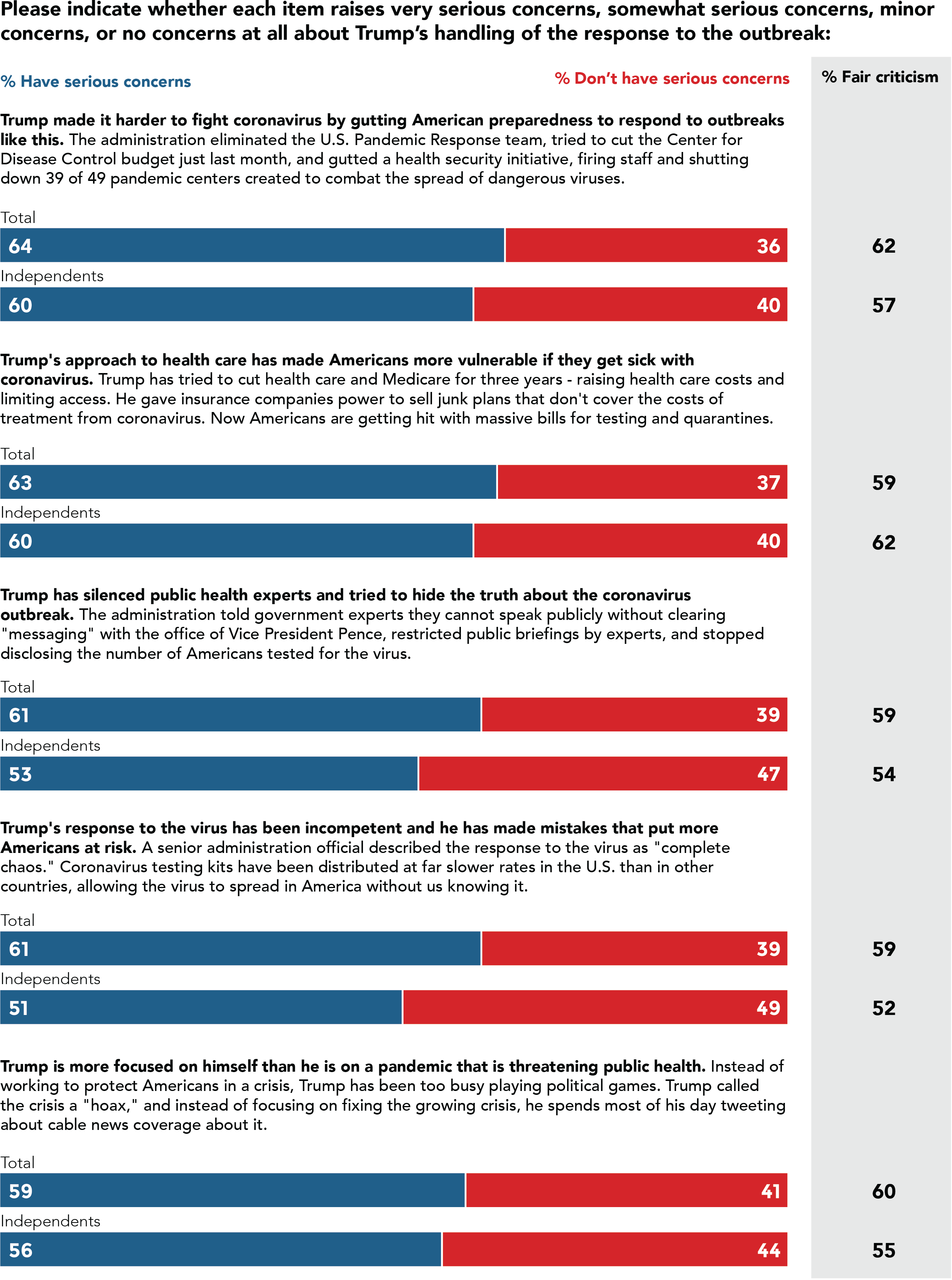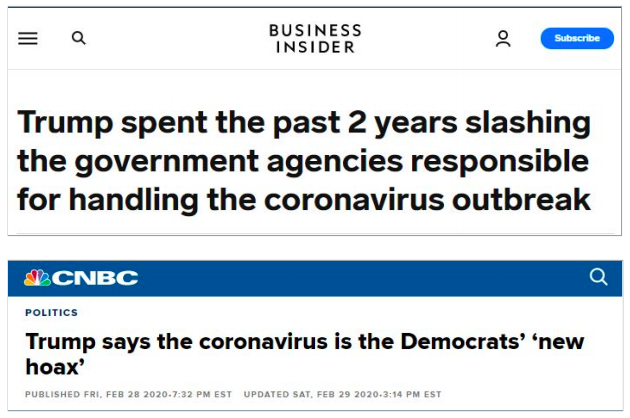Every month, we pick a few topics for exploration. The topics we select aren’t meant to cover every issue area facing the progressive community, but rather to give actionable advice on how to talk about key issue areas. This month, we focused on coronavirus as it continues to spread, how the public is responding to the crisis, and how Americans feel about the way the Trump administration is handling the outbreak.
Key Takeaways:
- Americans are highly aware of and very concerned about the coronavirus outbreak.
- The public disapproves of President Trump’s handling of the growing problem.
- Americans think it is fair to criticize Trump on the coronavirus response and are deeply concerned about how the administration has gutted pandemic preparedness and left Americans more vulnerable to a public health crisis.
taking precautions in their day-to-day lives.” show_quote_icon=”no” text_color=”#005e8a” width=”95″ line_height=”32″ border_color=”rgba(40,57,94,0.2)”]
Coronavirus is an unprecedented situation that the public is hearing more about than other major events in the recent past. More than nine out of ten Americans (94%) have heard “a lot” or “some” about the coronavirus outbreak, including 83% who have heard “a lot” about it. More Americans have heard a lot about coronavirus than had heard a lot about the government shutdown that lasted five weeks in February of 2019 (71%), the impeachment inquiry in November of 2019 (71%), or the release of the Mueller Report in May 2019 (38%).
The public overwhelmingly sees the outbreak as a major problem (83%) and fears the worst is yet to come. A majority of the public (51%) sees it as “a major problem, but not a crisis,” while an additional third (33%) say that the outbreak is best described as “a crisis.” Democrats are more likely to rate the outbreak as a major problem/crisis (92%) than Republicans (78%) or independents (69%). When asked about coronavirus in the United States, 53% say they feel the worst is yet to come, while 12% say the worst is over, and 35% are unsure. Independents are especially unsure about the state of the outbreak, with 55% of independents unsure.

Americans are more scared for their country than their own communities to date. The vast majority of Americans (72%) are concerned about a coronavirus outbreak becoming more widespread in the United States, while 61% are concerned about it spreading in their local communities, and 57% are concerned about someone in their family contracting coronavirus.
Public opinion is fluid on this topic. With events changing by the hour, it is important to recognize that what may be true today, might not be true tomorrow. The bulk of our survey was fielded from Friday March 6th through Sunday March 8th. In interviews conducted Friday, 31% thought coronavirus was a crisis and 80% saw it as a major problem/crisis. By Sunday, those numbers had ticked up to 35% and 87% and are undoubtedly higher now.
Over half of Americans (55%) have already performed precautionary behaviors, including:
- 35% who say they have bought disinfectant products and personal hygiene products,
- 34% who have avoided public spaces and events, and
- 16% who have stocked up on food.
Beyond those who have already taken action, 42% are considering avoiding public spaces and events
and 24% are considering stocking up on food.
More Americans disapprove (49%) than approve (42%) of Trump’s handling of the outbreak – a drop from his net positive ratings in early public polling.1 However, many remain uncertain and are less intense in their ratings. Americans are generally very strong in their ratings of the president – for example, 72% of Americans either strongly approve (26%) or strongly disapprove (46%) of the president in general. On coronavirus, his ratings are less defined, with 61% at those extremes (23% strongly approve; 38% strongly disapprove). Additionally, when asked to select which of two messages they agreed with more, 42% of Americans agree that Trump “has mishandled the coronavirus and put lives at risk” versus 37% who agree that Trump “moved quickly and effectively to limit the spread of the coronavirus in difficult circumstances.” Importantly, another 21% felt they do not know enough to say,
showing that there remains uncertainty about how Trump has handled the outbreak.
In contrast to Trump’s negative ratings, Americans view the CDC in a positive light and already give Democrats an advantage on who is better to handle this issue. Americans feel overwhelmingly favorable towards the Centers for Disease Control and Prevention (CDC) (75% favorable to 13% unfavorable). Meanwhile Democrats in Congress hold a 9-point advantage over Trump in trust to prevent the spread of coronavirus (43% trust Democrats in Congress compared to 34% for Trump) and a 4-point advantage in trust to respond to the coronavirus outbreak (42% to 38%).
The coronavirus outbreak may already be having effects on the state of the economy. While ratings of the state of the economy remain above water (53% positive to 42% negative), ratings are down a net 16-points since January (62% positive to 35% negative).
1. For example, Morning Consult polling showed President Trump receiving a narrowly net-positive rating (44% approve to 42% disapprove) for his handling of the outbreak as recently as a survey conducted March 3-5, a rapid decline from the week prior (56% approve to 27% disapprove).
Americans do not trust Trump to tell the truth on the outbreak. As the president tries to lead the country’s response, he already faces a crisis of trust. When presented with a list of descriptions about how Trump might handle coronavirus, 56% of respondents do not trust Trump to tell Americans the truth about the outbreak, and the same number (56%) do not trust Trump to worry about the country more than himself. Among white non-college respondents, trust in Trump to worry about the country more than himself and trust in him to tell the truth on the state of the outbreak are also low, with 48% not trusting Trump to put the country above himself and 47% not trusting him to tell Americans the truth about the outbreak.

Criticism is fair. While some of Trump’s defenders have tried to argue it is improper to highlight administration missteps regarding the coronavirus response, Americans think these criticisms are fair. Navigator presented respondents with five separate criticisms of Trump’s handling of coronavirus and between 59% and 62% said they each were fair criticisms, including 52% to 62% among independents. Moreover, most Americans express serious concerns about each criticism.
- Sixty-four percent (64%) of Americans and 60% of independents have serious concerns about Trump’s gutting of American preparedness to respond to outbreaks. The statement specifically mentioned the elimination of the U.S. pandemic response team and the shutting down of 39 of 49 pandemic centers around the world.
- 63% of Americans and again 60% of independents express serious concerns about how Trump’s approach to health care – including attempts to cut Medicare, sell junk insurance plans, and leave Americans paying massive bills for testing and quarantines – has made people more vulnerable if they get sick. This shows how progressives can make a critique that speaks to the immediate negative impacts of gutting the CDC, which can be paired with a long-term critique of Trump’s record on health care.
- Americans cited concerns about all three of the other statements shown, ranging between 59% and 61% concern for each. In other words, concern about the president’s handling of the issue is widespread and progressives should continue holding the administration accountable – especially when many Americans remain unsure of the severity of the crisis itself.

A separate exercise reinforces these findings. When presented with a series of actual news headlines from major outlets and asked which two raise the biggest concerns, respondents rated a headline about Trump spending the last two years gutting government agencies related to handling an outbreak (34%) and Trump saying coronavirus is Democrats’ newest hoax (33%) as the most concerning.


